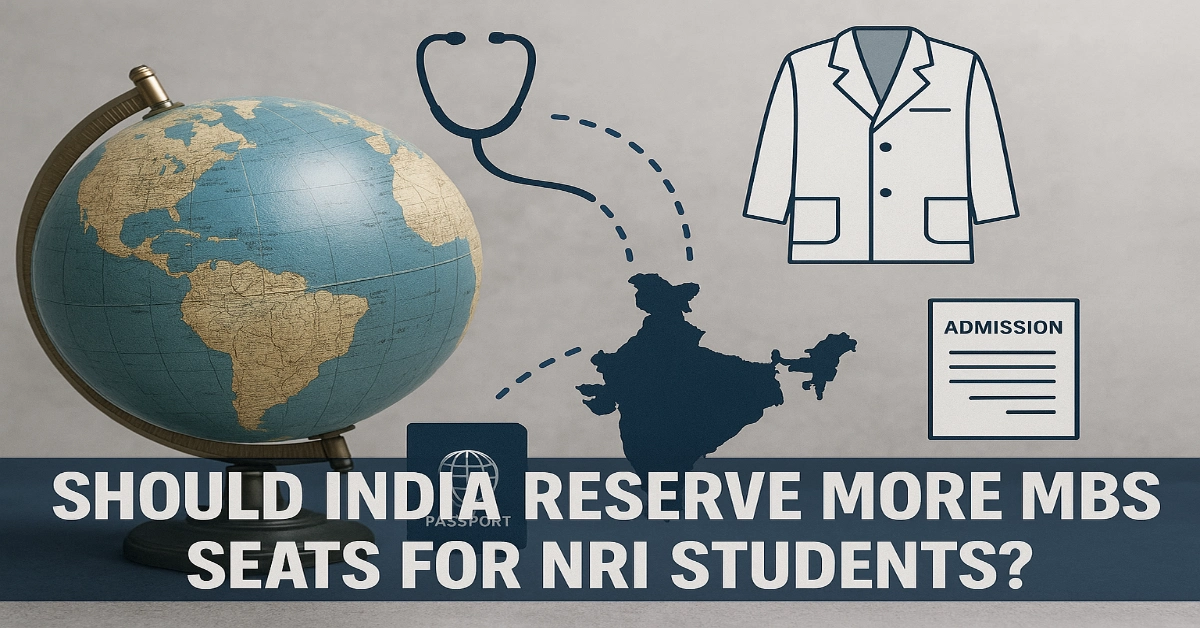NRI Quota in MBBS 2025: In recent years, India’s MBBS programs have gained immense popularity among Non-Resident Indians (NRIs), especially those from the Middle East, Africa, and Southeast Asia. Affordable tuition, English-medium instruction, globally recognised curricula, and familiar cultural settings make India an attractive destination.
However, despite the rising demand, a paradox exists: hundreds of NRI quota seats remain vacant every year.
This has started a national discussion: Should India reserve more MBBS seats for NRI students, or should the existing 15% quota be restructured?
NRI Quota in MBBS 2025: What Does the 15% Reservation Mean?
As per the National Medical Commission (NMC) and Medical Counselling Committee (MCC) guidelines, 15% of seats in private and deemed medical colleges are reserved for NRI candidates.
Key Features of the NRI Quota:
| Parameter | Details |
|---|---|
| Eligibility | Indian-origin students or children of Indian citizens living abroad |
| Quota Percentage | Up to 15% in private/deemed universities |
| Tuition Fees | Generally, 2-5 times higher than Indian student fees |
| Admission Route | NEET-UG qualification mandatory |
| Counselling Authority | MCC (for deemed universities), State DME (for private colleges) |
This policy was designed to ensure that children of Indian-origin families abroad could still access the Indian education system while contributing financially to the private sector.
Why is the Demand for NRI Quota in MBBS 2025 Rising?
Several factors have contributed to the increasing number of NRI students choosing India over foreign destinations:
High Cost of Medical Education Abroad
Countries like the US, UK, and Australia have skyrocketing tuition fees and visa uncertainties.
Global Recognition of Indian MBBS
India’s medical curriculum, aligned with NMC and WHO standards, is now widely accepted for postgraduate training in countries like the UK, UAE, and Australia.
Cultural and Emotional Proximity
For Indian-origin families settled abroad, India offers cultural comfort, language familiarity, and often extended family support, easing the transition for young students.
Post-MBBS Career Flexibility
With new NMC regulations, Indian MBBS graduates can pursue PG or licensing in India, the Gulf, or Western nations, offering multi-directional career mobility.
Unfilled NRI Quota in MBBS 2025
Despite growing interest, a large number of NRI quota seats go vacant each year, especially in Tier-2 private medical colleges.
Reasons Behind Vacancies:
- Exorbitant fees in the range of ₹25-₹50 lakh per year.
- Limited awareness among NRI families about official counselling processes.
- Complicated documentation (proof of NRI status, embassy letters, etc.).
- Preference for reputed colleges leads to an imbalance in seat demand.
This vacancy paradox raises an important policy question: Is the current 15% NRI quota justified when even existing seats aren’t being fully utilised?
Read Also: Why NRIs Are Returning to India for MBBS: How NRI Quotas Are Benefiting Students and Colleges?
The Case for Expanding NRI Quota
Global Indian Outreach
India could strategically expand its educational diplomacy by opening more NRI seats for children of the diaspora, especially in Gulf and African countries, where demand for Indian education is high.
Foreign Exchange and Institutional Funding
NRI fees significantly boost the revenue base of private medical colleges, enabling investment in labs, hospitals, and faculty recruitment, indirectly benefiting domestic students too.
Reduced Dependence on Foreign MBBS Destinations
By offering more NRI-friendly seats, India could retain a large portion of Indian-origin students who would otherwise go to Georgia, Russia, Uzbekistan, or other cheaper European destinations.
The Case for Rationalising (Not Expanding) the Quota
Wastage of Seats
When NRI seats remain unfilled, colleges often struggle to convert them to general seats due to bureaucratic delays.
Rationalising the quota could optimise seat utilisation.
Rising Inequality
Expanding the quota could tilt the private medical system toward high-income groups, further marginalising middle-class Indian aspirants.
Quality over Quantity
Instead of expanding the quota, NMC could set differential fee slabs, ensuring that NRI students pay fairly without making the system profit-driven.
What Stakeholders Say
Education Policy Experts
Experts suggest that the 15% NRI quota cap should be flexible, depending on actual demand and seat vacancy data, but subject to regulatory monitoring to prevent misuse.
Medical College Administrators
Many college administrators argue that rationalising the fee structure for NRI students would help fill existing seats rather than expanding the quota.
Parents and NRI Students
Most NRI parents advocate transparent online counselling and simplified documentation, not necessarily more seats.
Read Also: MBBS NRI Quota Fees 2025-26: Eligibility, Cut-off, Documents, Seats, Fees etc
Policy Options Going Forward
| Proposal | Description | Expected Impact |
|---|---|---|
| Quota Flexibility | Allow colleges to adjust the NRI quota between 10-20% based on demand | Optimal seat utilisation |
| Fee Rationalization | Standardise NRI fees under state fee regulatory committees | Better affordability |
| Unified NRI Portal | Centralised application and documentation verification | Transparency and accessibility |
| Conversion Rules | Allow early conversion of vacant NRI seats to Indian seats | Zero seat wastage |
Time for a Balanced Policy
The question isn’t just “Should India reserve more MBBS seats for NRI students?”, it’s “How can India make the NRI quota system more efficient, transparent, and equitable?”
Expanding the quota without addressing affordability and accessibility won’t solve the real issue.
A data-driven, flexible quota policy that aligns with actual demand and ensures no seat goes unutilized could be the most practical way forward.

